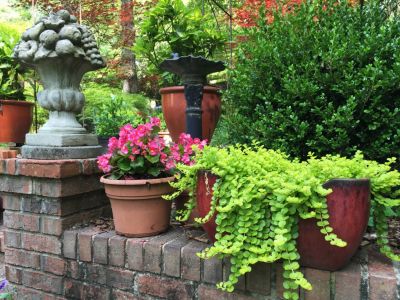About Creeping Jenny Plants
This is a trailing, or creeping, herbaceous perennial that produces waxy, small round leaves on thin stems. It is hardy in zones 3 through 9 and includes several cultivars of Lysimachia nummularia. Native to Europe, some of the varieties are more aggressive than others and can be considered invasive. In addition to the pretty leaves, creeping Jenny produces small, cupped yellow flowers beginning in early summer and continuing intermittently through the fall. The green variety is more invasive, but the color of the flowers looks nice contrasted with the green leaves. The golden variety is not as aggressive, but the flowers are less conspicuous. Potted creeping Jenny is a great alternative to putting these plants in the ground, where they can quickly get out of control.
Container Grown Creeping Jenny
Each creeping Jenny plant will grow like a mat, only rising to 6 to 12 inches (15-31 cm.) in height. Creeping Jenny in a bed looks great as a groundcover for this reason, but in a container, it can look a little flat. Combine it in a pot with taller-growing plants for contrast. Another great use for creeping Jenny in a container is to create a vine-like effect in a hanging pot. Creeping Jenny grows readily and quickly, so plant them 12 to 18 inches (31-46 cm.) apart. Provide a location that is sunny or only has partial shade. The more shade it gets, the greener the leaves will be. These plants like moist soil too, so water regularly and ensure good drainage in the container. Any basic potting soil is adequate. With its vigorous growth and spreading, don’t be afraid to trim creeping Jenny back as needed. Be sure to take care when cleaning out pots at the end of the season as dumping this plant in the yard or in a bed can lead to invasive growth next year. You can also take the container indoors, as creeping Jenny grows well as a houseplant. Just be sure to give it a cooler spot in the winter.
